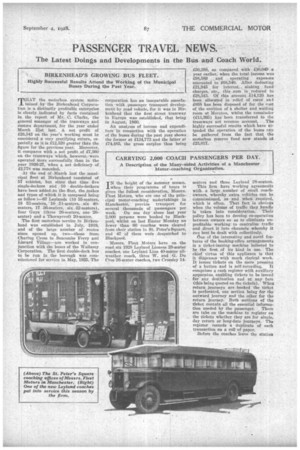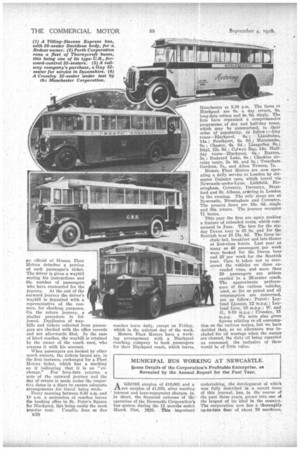CARRYING 2,000 COACH PASSENGERS PER DAY.
Page 21

Page 22

If you've noticed an error in this article please click here to report it so we can fix it.
A Description of the Many-sided Activities of a Manchester Motor-coaching Organization.
IN the height of the summer season, when their programme of tours is given the fullest consideration, Messrs. Fleet Motors, who are one of the principal motor-coaching undertakings in Manchester, provide transport for several thousands of passengers per
week. On one day alone last year 2,000 persons were booked to Blackpool, whilst on last Easter Monday no fewer than 60 coaches were cleared from their station in St. Peter's Square, and 41 of them weee despatched to Blackpool.
Messrs. Fleet Motors have on the road six 1928 Leyland Lioness 28-seater coaches, one Leyland Lion 40-seater allweather coach, three W. and G. Du Cros 26-seater complies, two Crossley 14
seaters and three Leyland 28-seaters.
This firm have workingagreements with a large number of small coachowners, whereby extra vehicles can be commissioned, as and when "required, which is often_ That fact is obvions when the volume of traffic they handle is taken into consideration. Their policy has been to develop co-operation between owners so as to eliminate unprofitable working to centralize traffic and direct it into channels whereby it can best be dealt with collectively.
One of the interesting and novel features of the booking-office arrangements it a ticket-issuing machine believed to be the first of its kind in use. The chief virtue of this appliance is that it dispenses with much clerical work. It issues tickets on the mere pressing
of a button and is self-recordiug,. It comprises a cash register with auxiliary apparatus, enabling tickets to be issued for any destination and at any fare (this being quoted on the tickets). When return journeys are booked the ticket is perforated, one section being for the outward journey and the other for the return journey. Both sections of the ticket contain all the essential information needed by the passenger. There are tabs on the machine to register on the tickets whether they are for single, day return or long-date journeys. The register records a duplicate of each transaction on a roll of .paper.
Before the coaches leave the station
an official of Messrs. Fleet Motors detaches a portion of each passenger's ticket. The driver is given a waybill stating his instructions and the number of passengers who have contracted for the journey. At the end of the outward journey the driver's waybill is deposited with a representative of the concern, for checking purposes. On the return journey, a similar procedure is followed. Duplicates, of waybills and tickets collected from passengers are checked with the office records and are afterwards filed. In the case of hired coaches, the waybill is retained by the owner of the coach used, who returns it with his account.
When passengers are booked by other coach owners, the tickets issued are, in the first instance, exchanged for a Fleet Motors ticket, which has a marking on it indicating that it is an "exchange." For long-date returns, a note of the outward journey and the day of return is made under the respective dates in a diary to ensure adequate arrangements for travel being made.
Every morning between 8.30 a.m. and 10 a.m, a succession of coaches leaves the booking office in St. Peter's Square for Blackpool, this being easily the most popular tour. Usually, four or -five B38 coaches leave daily, except on Friday, which is the quietest day of the week. Messrs. Fleet Motors have a working arrangement with a Blackpool coaching company to book passengers for their Blackpool coach, which leaves Manchester at 5.30 p.m. The fares to Blackpool are 6s. a day return, 95. long-date return and 4s. 6d. single. The firm have organized a comprehensive programme of day and half-day tours, which may be summarized, in their order of popularity, as follow :—Day tours—Blackpool, 6s. ; Llandudno, 14s.; Southport, es. 6d.• Morecambe, Ps.; Chester, Os. 6d.; Llangollen 9s.; Rhyl, 12s. 6d.; Colwyn Bay, 14s. Halfday tours—Blackpool, 6s.; Buxton, 5s.; Rutlyard Lake, es.; Cheshire circular tours, 2s. 6d. and 35.; Trentham Gardens, 7s., and Alton Towers, 7s.
Messrs. Fleet Motors are now operating a daily service to London by sixseater Daimler cars, which travel via liewcastle-under-Lyne, Lichfield, Birmingham' Coventry, Daventry, Stratford and St. Albans, araiving in London in the evening. The only stops are at Newcastle, Birmingham and Coventry. The present fares are 16s. 6d. single and 30s. return. The journey occupies 7i hours.
This year the firm are again making a feature of extended tours, which commenced in June. The fare for the sixday Devon tour is £8 8s. and for the Scottish tour £8 18s. 6d. The fares include bed, breakfast and late dinner at first-class hotels. Last year as many as 40 passengers per week were booked for the Devon tour and 25 per week for the Scottish tour. Care is taken not to overcrowd the vehicles on these ex tended runs, and more than 20 passengers are seldom carried in a 28-seater coach. The approximate performance of the various vehicles, used, so far as petrol and oil consumption are concerned, are as follow: Petrol: Leyland Lioness, 12 m.p.g. ' • Leyland Lion, 10 m.p.g.; Vir. and G., 8-10 m.p.g.; Crossley, 15 m.p.g. We were also given figures relating to oil consumption on the various makes, but we have decided that, as no allowance was included for oil wastage when the sumps are cleaned, the dirty oil being regarded as consumed, the inclusion of them would be of little value.
































